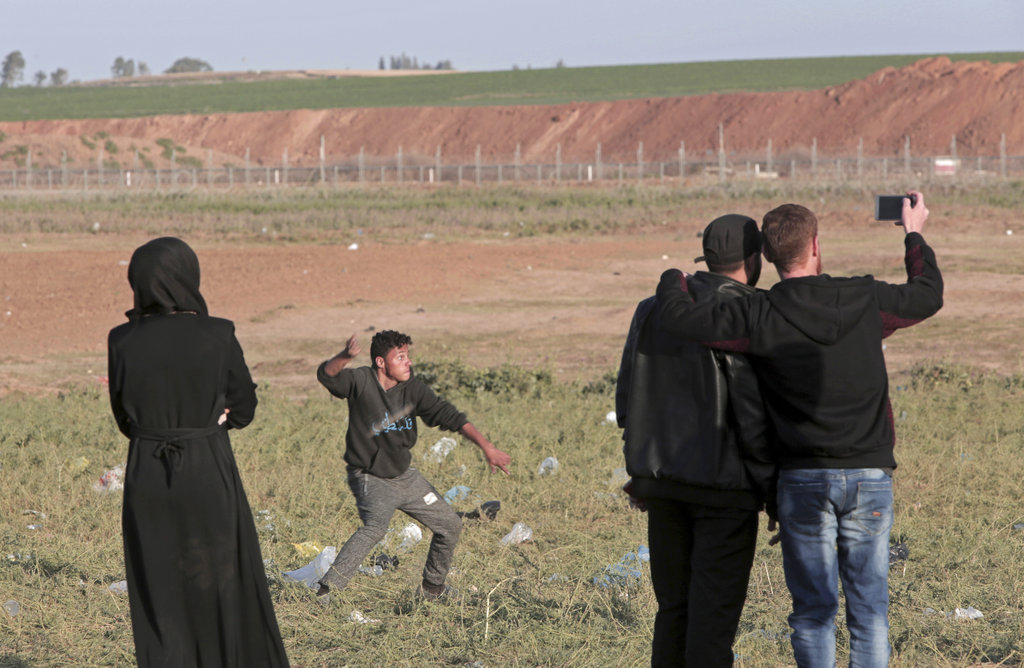A freelance journalist in Gaza said he thinks his WhatsApp account was targeted because he was on a group called Hamas Media.
By World Israel News Staff and AP
A few hours after the latest cease-fire took effect in the Gaza Strip, a number of journalists in the coastal enclave found they were blocked from accessing WhatsApp messenger — a crucial tool used to communicate with sources, editors and the world beyond the blockaded strip.
The Associated Press reached out to 17 journalists in Gaza who confirmed their Whatsapp accounts had been blocked since Friday. By midday Monday, only four journalists — working for Al Jazeera — confirmed their accounts had been restored.
Twelve of the 17 journalists contacted by the AP said they had been part of a WhatsApp group that disseminates information related to the Hamas terror group’s military operations. Hamas runs a brutal regime that rules the Gaza Strip, and has been designated a terrorist organization by Western countries and Israel.
Hamas runs Gaza’s Health Ministry, which has a WhatsApp group followed by more than 80 people, many of them journalists. That group, for example, has not been blocked.
Hassan Slaieh, a freelance journalist in Gaza whose WhatsApp account is blocked, said he thinks his account might have been targeted because he was on a group called Hamas Media.
“This has affected my work and my income because I lost conversations with sources and people,” Slaieh said.
Wael al-Dahdouh, the chief correspondent in Gaza of Al Jazeera, a Qatari state-owned media outlet that broadcasts anti-Semitic and anti-Israel content worldwide, said his access to WhatsApp was blocked around dawn on Friday before it was reinstated Monday.
Prior to the war in May, Al Jazeera shared a building in Gaza with Hamas military intelligence, according to the Israeli military, which was destroyed during the war by IDF airstrikes.
The Israeli military telephoned a warning, giving occupants of the building one hour to evacuate. No one was harmed in the airstrike.
A WhatsApp spokesperson said the company bans accounts to comply with its policies “to prevent harm as well as applicable law.” The company said it has been in touch with media outlets over the last week about its practices. “We will reinstate journalists if any were impacted,” the company said.
Al Jazeera said that when it sought information regarding its four journalists in Gaza impacted by the blockage, they were told by Facebook that the company had blocked the numbers of groups based out of Gaza and consequently the cell phone numbers of Al Jazeera journalists were part of the groups they had blocked.
Among those affected by the WhatsApp blockage are two Agence France-Presse journalists. The Paris-based international news service told the AP it is working with WhatsApp to understand what the problem is and to restore their accounts.
During the 11-day war, terrorists in Gaza launched thousands of rockets at Israeli population centers, killing civilians, including a five-year-old boy.
It’s not the first time journalists have been suddenly barred from WhatsApp. In 2019, a number of journalists in Gaza had their accounts blocked without explanation. The accounts of those working with international media organizations were restored after contacting the company.
WhatsApp said it does not have access to the contents of people’s personal chats, but that they ban accounts when information is reported they believe indicates a user may be involved in causing imminent harm. The company said it also responds to “valid legal requests from law enforcement for the limited information available to us.”


